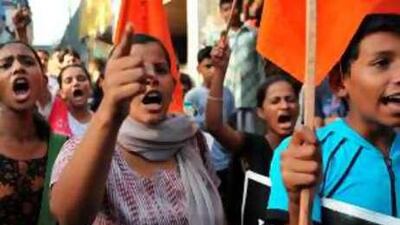SARDIHA, WEST BENGAL // Mobile phone conversations of known Maoist leaders have confirmed the group's involvement in a rail crash that killed 146 people in eastern India last week, a state intelligence department official said. The official told The National the department had recorded conversations between members and leaders of the Maoist frontal group, the People's Committee Against Police Atrocities (PCAPA), before and after Friday's derailment of the Maharashtra-bound Gyaneshwari Super Deluxe Express, which was subsequently struck by a goods train.
"From late in the evening on Thursday on the mobiles of some of our known Maoist leaders we had intercepted phone calls that hinted that some men were planning a subversive operation on a railway track. The same men, minutes after the derailment, began intimating their leaders of a 'successful operation' in a jubilant mood ? We are dead sure Maoists triggered this disaster," said the official, who chose to remain anonymous because of the sensitivity of the information.
The PCAPA denied they sabotaged the track near the village of Sardiha, 135km west of Kolkata. Other Maoists, meanwhile, have suggested the attack was carried out by rogue elements of the PCAPA. A Communist Party of India [Maoist] squad leader in West Bengal, identified only as Tapan, said some young members of several "village defence squads" who were raised by Maoists were undisciplined and indulging in acts not endorsed by Maoist command.
"Because of organisational problems we have little control over these village defence squad members ? and because of these undisciplined men we are facing embarrassment and the Maoists' image is being sullied - dented," he said. However, India's home minister, Palaniappan Chidambaram, said the CPI [Maoist] or one of its front organisations, such as the PCAPA, was a probable suspect. "The needle of suspicion points to the CPI [Maoist] or its front organisation. The identity of the culprits can be established only after the investigation is over," Mr Chidambaram said.
One senior police officer in Kolkata appeared to reinforce this view when he said he believed the Maoist leadership had no knowledge about Friday's sabotage beforehand and those "rogue PCAPA or village defence squad" men acted on their own, targeting the train. These men, who for sometime have been involved in extortion, murder and other crimes, have become a Frankenstein's monster that the Maoists can no longer control," said the police officer who did not want to be identified.
However, West Bengal police officials said yesterday they were "doubtlessly sure" that the PCAPA was behind the sabotage of the track and the criminal investigation department, in its report to the West Bengal chief minister, had provided the details on how exactly the sabotage had been carried out by two local PCAPA leaders, who had been released on bail after another alleged offence. "The two men, along with some other PCAPA members and some other railway linesmen removed the [elastic rail] clips, to derail the train. We have identified the entire group and hope to arrest them soon," said Bhupinder Singh, the West Bengal police chief.
CID officials believe the linesmen, who live in nearby villages, were picked up from their homes at gunpoint by Maoist PCAPA members and forced to sabotage the track. "We are not 100 per cent, but 1,000 per cent sure that the PCAPA men engineered the derailment," said Zulfiquar Hassan, an inspector general of police in charge of the region. After an initial inquiry just hours after the crash, Indian Railway officials said they believed the crash was caused by sabotage. They found that crucial pieces of the track, known as fish plates, had been unfastened along a 40-metre stretch of track and a 50cm section of rail had been removed.
Raj Kanojia, the CID additional director general, said that from their investigation his department was sure the PCAPA men got the rail clips removed in the act of the sabotage. "It will take some more time to find out if the rail was also sawn off to facilitate the derailment," Mr Kanojia said. The mobile phone interceptions of Maoist leaders' conversations provided "crucial clues" in solving the case, the intelligence department official said. "In one of the intercepts one leader [a few minutes before the derailment] is heard saying, 'We have got the jilapis [fastening clips] removed and the train is expected to reach the spot within 10 minutes'.
"From the other side, another leader instructed: 'Leave the spot with all men quickly, but keep a watch from a safe distance.' "Some hours after the disaster we stumbled on these intercepts and became sure that the conversation was related to the derailment." The official added that the mobile phone numbers belong members of the PCAPA had been under intelligence surveillance for a long time. Yesterday, Maoist leaders continued to insist they were not to blame. "Our cadres were in no way involved with the train disaster. We can never be behind any operation where civilians are targeted - it's against our ideology," said Chand, a spokesperson of the Maoist People's Liberation Group, speaking by on the phone from a hideout in central India.
Shortly after the disaster, the PCAPA chief, Asit Mahato, said his group was not involved and alleged that West Bengal's ruling Communist Party of India [Marxist] was behind the sabotage. "In a conspiracy, some CPI [M] leaders have triggered the train disaster attempting to malign us and wean us away from the people who support us," Mr Mahato said in a statement to the media. foreign.desk@thenational.ae

